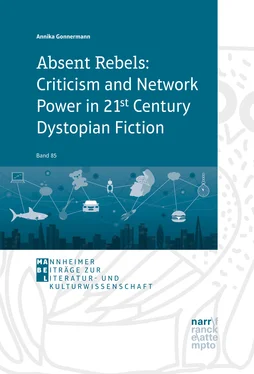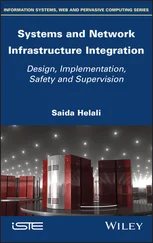the more unjust and unequal American society has become, the more we have heard about how bad, say, the Holocaust was. […] So maybe it’s time to forget about the Holocaust for a while and focus on the free market instead, to stop congratulating ourselves on being against genocide and to start questioning what it means to be for free trade. (“Going Boom”)
Inevitably, these novels are products of the system they want to criticise in the first place and have thus weakened their own position to do so. Subversive fiction must be aware of these limitations and consider them in their own production of literature.
Contemporary Dystopian Writing, ‘Immanent Criticism,’ and David Grewal’s Network Power (2008)
Contemporary dystopias and changes in their style and structure make sense when read within the tradition of immanent criticism, employing this method as the narrative modus operandi . Externally, they seem to agree with Tom Boland, who laments the ineffectiveness of external criticism: “perhaps the remedy to the crisis of critique is not more or better or purified critique, but other ways of thinking” (“Cacophony”). As previously stated, immanent criticism is neither a straightforward matter of imposing one world view onto another (external criticism), nor is its aim to recover the underlying values and morals (internal criticism). In the tradition of the Critical Theory as brought forth by the Frankfurt School, immanent criticism is essentially diagnostic in nature: it requires neither an Archimedean point of reference outside a system, nor a direct recipient. Its transformational potential aims to solve the immanent paradoxes by making them comprehensible in the first place, rather than supplanting one system with another. It does not claim to know a solution to the problem but is restrains itself to analysing the systemic inconsistencies, and to develop reforms based on what it has identified as defective.
In order to analyse said systemic inconsistencies, immanent criticism always relies on a theoretical framework necessary for illuminating the immanent contradictions of the respective object of critique. This theoretical framework is needed to trace the connections between two seemingly unrelated phenomena, which – upon closer inspection – are co-dependant and arise out of the same structures. As has already been mentioned, capitalism’s destructive attitude towards families and its simultaneous reliance on family structures to produce future workers and to create and maintain a recreative safe place for stressed workers to relax is a case in point (Fisher 32f.). Another is neoliberalism’s claim to be the system which produces most freedom for everyone. The free market stylises itself to be the one social order, which has fulfilled the promises of civilisation, having created free individuals that answer to no higher authority than to themselves (cf. Shonkwiler and La Berge 4f.). Shunning any form of coercion and force (e.g. in the shape of enforced labour, cf. Dörre 23),1 neoliberalism seems to achieve freedom to its “highest possible extent” (E. Olin Wright 50). As Serena Olsaretti paraphrases the advocates of the free market, “since the free market hosts only mutually advantageous and therefore non-coercive transactions, it is a realm in which freedom and voluntariness alike are respected” (141f.). Consequently, as Johansen and Karl argue, neoliberalist thought claims to achieve as much ‘freedom’ for the individual as possible:
[N]eoliberalism [is] an economic dogma and political rationale that holds that free markets and competition will produce the best outcomes for the most people. This tenet often presumes and produces scenarios of radical individualism and self-proprietorship that are predicated upon this competitive ethos. (3)
In sum, neoliberalist rhetoric “with its foundational emphasis upon individual freedoms” (Harvey, Neoliberalism 41) uses freedom as key terminology, advocating neoliberalism as the prime engine of individual freedom and responsibility. The “assumption that individual freedoms are guaranteed by freedom of the market and of trade is a cardinal feature of neoliberal thinking” (ibid. 7), seemingly making the system more appealing. As Zygmunt Bauman writes, the individual is made “responsible for his or her actions” ( Freedom 3) in modern Western free market capitalism, resulting in the individual obtaining “the whole and undivided responsibility for the action” (ibid. 2f.). Indeed, the very name “free market” conjures associations with opportunity, choice, and free will, culminating in the claim that “the market implies not compulsion but freedom” (Wood, Origin 6). This notion of neoliberal capitalism, as the “guardian of liberty” (Metcalf) or as “perfection of freedom” (ibid. 16), is based on a process that Stuart Hall and Alan O’Shea have termed “individualisation of everyone” (12).
Although advocates of neoliberalism argue that everyone “who lives in [a] neoliberal society is free to determine their fate” (Fevre 13; cf. also Mirowski 100), reality has proven the promises made to be deceptive at best and false at worst. Therefore the discussions around freedom within neoliberalism move centre stage, ever since Karl Marx argued in Das Kapital (1867) that “one of the historical conditions for capital’s eventual hegemony […] is the generalized appearance that market exchange, as a formal and hence non-coercive social mechanism, replaces direct coercive control (founded on religious bond, feudal obligation, or absolutist prerogative)” (Best 505), fostering the illusion of autonomous, ‘free’ individuals. As David Harvey writes, “[p]olitical struggles over the proper conception of rights, and even of freedom itself, move centre-stage in the search for alternatives” to neoliberal capitalism ( Neoliberalism 182). Continuing, he states that neoliberalism has put on “a benevolent mask full of wonderful-sounding words like freedom, liberty, choice, and rights” (ibid. 119). These words, however, only “hide the grim realities of the restoration of reconstitution of naked class power” (ibid.) within a neoliberalist context; the critics of neoliberalism indicate that neoliberal individualism “condemns them to less and less freedom, even as common knowledge declares it self-evident that their fates are in their own hands” (Fevre 13f.). Harvey continues by providing examples from Britain and the United States where the neoliberal system is much more prominent than in parts of Europe.
This obvious paradox (the insistence on freedom, while simultaneously producing conditions that systematically undermine the possibility to lead a free life) is a possible leverage point of immanent criticism. Its argumentative cogency arises from the fact that neoliberalism is a construct full of such inherent contradictions, creating mutually exclusive demands that make it impossible to sustain both at any given time. Immanent criticism is the only form of critique able to visualise the connections between the freedom-focused agenda of neoliberalism and the coercive structures in which individuals find themselves – despite the absence of totalitarian leaders, and without resorting to notions of false consciousness.2 Exemplifying the paradigmatic merit of literature, dystopian fiction in combination with immanent criticism offers a mode of reading that disturbs the common sense offered by neoliberalism. By applying immanent criticism these novels demystify the claims of neoliberalism, showing that this form of life can neither fulfil its promises nor provide a sustainable path for the development of future generations. They thus deconstruct the claims brought forth by neoliberalist advocates, and allow us to see the inherent contradiction within the system. It may pass off as freedom as it seems uncoupled to the juridico-political notion of power, however it produces a yet more complex web of power difficult to define theoretically. In the words of Hannah Arendt, “the rule by nobody is not necessarily no-rule; it may indeed, under certain circumstances, even turn out to be one of its cruellest and most tyrannical versions” ( Condition 40).
Читать дальше












